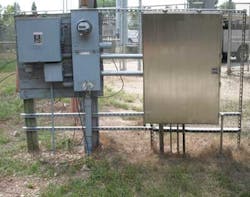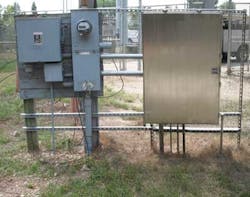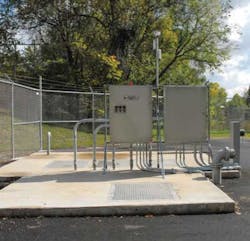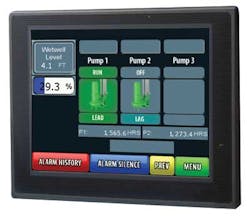An Uplifting Change
Updated control panel helps operators remotely access data, spot trends, and respond to alarms
The need for residential and industrial expansion in the city of Rock Falls, Ill., contributed to a recent upgrade of a 50-year-old lift station. Built in the 1960s, the station was antiquated, and the decision to install a more reliable lift station could not have been timelier.
The opportunity for the restoration stemmed from a renovation of the Rock Falls Water Reclamation Facility in July 2011. After supplying new control panels to all 10 lift stations in Rock Falls, the city turned to Metropolitan Industries Inc. (Romeoville, Ill.) to provide an efficient and more versatile controller to one of the city's older lift stations.
Metropolitan's LMS II is a pre-programmed, high- performance, wet-well level controller that gives users access to basic SCADA features at a cost-effective price. It was installed to provide the city with a more reliable way to remotely access data. The technology was employed in the city's largest lift station, which services 1/3 of the residents of Rock Falls.
"The wastewater treatment plant and collection system was far behind in software innovations," said Ed Cox, Rock Falls Water Reclamation Facility superintendent. "The LMS II helps save us time and gives us the ability to view trends."
Cox worked with engineering firm Willett Hofmann & Associates of Dixon, Ill., and Metropolitan Industries Municipal Salesperson Dan Howorth. "The LMS II has given our personnel the opportunity to respond better to alarms," he said. "We can see exactly what the problem is before driving out to any of the stations, which in return has allowed us to save time throughout our day."
Serving as an upgraded version of the control panels previously installed in the Rock Falls Lift Stations, the LMS II has provided many benefits, including saving monthly water costs, assisting with the day-to-day operations and providing a better data collection system.
The upgrade to the lift station is complete with two running pumps and the capability to run a third pump for the city's future expansion. "All 10 of our stations are supplied with Metropolitan panels," Cox said. "The goal now is to slowly integrate the LMS II into the rest of the Rock Falls stations."
The original station was a confined underground dry-pit station that operated at full capacity and could not handle any additional flow with the industrial park expanding. Further, the controls were also underground and subject to constant flooding danger.
The new station was built next to the original station, which allowed for a seamless transfer, and the original station operated until the switch to the new station was made.
"We wanted to flip a switch and have no one know what was done, or changed, and that happened with this project," said Cox. "We had tremendous customer service with Metropolitan, informing us of delays and immediately handling any concerns. This was a job I didn't have to worry about because I could trust in Metropolitan to get it done."



